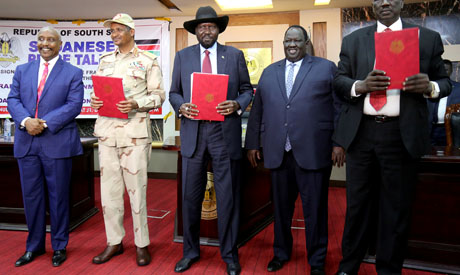Date: Thursday, 30 January 2020

Sudan’s transitional government and the Sudan People’s Liberation Movement faction under the leadership of Malik Agar (SPLM-N Agar) signed a framework peace agreement in Juba that included security arrangements, amendments to governance, and granting special status to the Blue Nile and South Kordofan states.
The agreement was signed between Vice President of the transitional government Mohamed Hamadan Dagalo, aka Hemedti, SPLM-N Agar Chief of Staff Ahmed Al-Omda Badi and Tout Gelwak, chief of mediation, with the sponsorship of South Sudan President Salva Kiir.
Since the signing of the Juba Declaration between the Sudan government and armed movements on 14 October, the South Sudan capital has been hosting rounds of negotiations, the last of which was on 10 January, culminating in the framework agreement.
The declaration included a ceasefire, delivery of humanitarian assistance, compensation for the victims of war and trust-building procedures.
The SPLM-N had been fighting against the regime of toppled President Omar Al-Bashir since 2011 in the Blue Nile and South Kordofan states, during which time the regime committed human rights violations and war crimes, according to rights organisations.
However, in the past few years, the SPLM-N was split between a majority led by Abdel-Aziz Al-Helw in South Kordofan, and a minority led by Malek Aqar — who signed the framework agreement — in the state of the Blue Nile.
Barricaded in the mountainous area of Kawda, where no Sudanese official save for new Prime Minister Abdalla Hamdok had visited since the onset of the 2011 conflict, Al-Helw has been demanding a sectarian regime and granting the Blue Nile and South Kordofan the right to autonomy.
In Juba, the rounds of negotiations focused on five areas: Darfur, the Blue Nile and South Kordofan, and east, north and centre of Sudan.
According to the constitutional declarations governing the transitional period in Sudan, signed in August 2019, the government is responsible for conducting peace talks that lead to an end of the war within six months.
By mid-February it is expected talks will continue in South Sudan for the remaining parties to reach framework agreements that lead to a comprehensive peace deal.
The deadline is relatively tight, and may be extended to mid-year, according to Mohamed Al-Asbat, a Sudanese journalist residing in Paris.
Negotiators on behalf of north and central Sudan are not being clear about their demands. The two regions haven’t witnessed civil wars since the independence of the country from occupation in January 1956.
“The two regions didn’t demand autonomous rule. They want development,” explained Al-Asbat. “The original residents of north and central Sudan have been ruling the two regions since unification at the hands of Mohamed Ali two centuries ago.”
Sudan was unified by Mohamed Ali in 1821, with Khartoum as its capital. North Sudan’s people remained the elite of the ruling regime ever since.
Nonetheless, north Sudan is suffering a lack of development, due to the migration of its people seeking jobs and education. In addition, the Khartoum regime focused on the centre of the country, being a source for vast agriculture and livestock.
Peace deals are still shrouded in ambiguity. Armed movements are demanding that their elements join the army after its restructuring, and many of their people want government jobs. The regime will not be able to grant them this request due to the deteriorating economic and financial conditions in the country.
The Sudanese government already laid off hundreds of employees loyal to Al-Bashir’s regime. These have not been replaced.
A wave of arrests was conducted. Bakri Hassan Saleh, the former vice president and the first prime minister for Al-Bashir, was apprehended pending investigations about the coup that delivered Al-Bashir to the helm in 1989.
While Juba is hosting negotiations for peace in Sudan, Khartoum is sponsoring talks between South Sudan factions.
In South Sudan, negotiations are underway between the government of Kiir and his former vice president, Riek Machar, with Sudanese mediation led by Hemedti, with the aim of urging the two parties to implement the peace agreement signed in the Ethiopian capital in September 2018.
The agreement stipulated an end to the civil war between the followers of Kiir and Machar, which has been ongoing for five years since Kiir accused his deputy of plotting a coup. In 2013, tens of thousands of people were killed and millions displaced as a result.
The UN said the world’s latest independent state was on the verge of famine. More than a third of South Sudan’s people depend fully on humanitarian assistance.
The Intergovernmental Authority for Development (IGAD) in East Africa led arduous negotiations between the Kiir and Machar, leading to the signing of a peace agreement, which soon collapsed in July 2016, while Machar remains under house arrest in Khartoum.
In South Sudan, the two parties reached a deal to form a transitional government and integrate the two forces into one army.
The two parties, however, are squabbling over the 28 states of South Sudan. Kiir wants to maintain the number of states as is, while Machar insists on shrinking their number.
Kiir wants a larger number of states “to break up the power of the Noweir tribe, to which Machar belongs”, said Al-Asbat.
The Dinka tribe, from which hails Kiir, represents 40 per cent of the people of South Sudan, according to UN estimates, while the Noweir tribe comprises only 17 per cent of the population.
That the government of Hamdok is persistent in its efforts towards peace in Sudan may eventually lead to the reunification of Sudan. But this could take years to materialise.